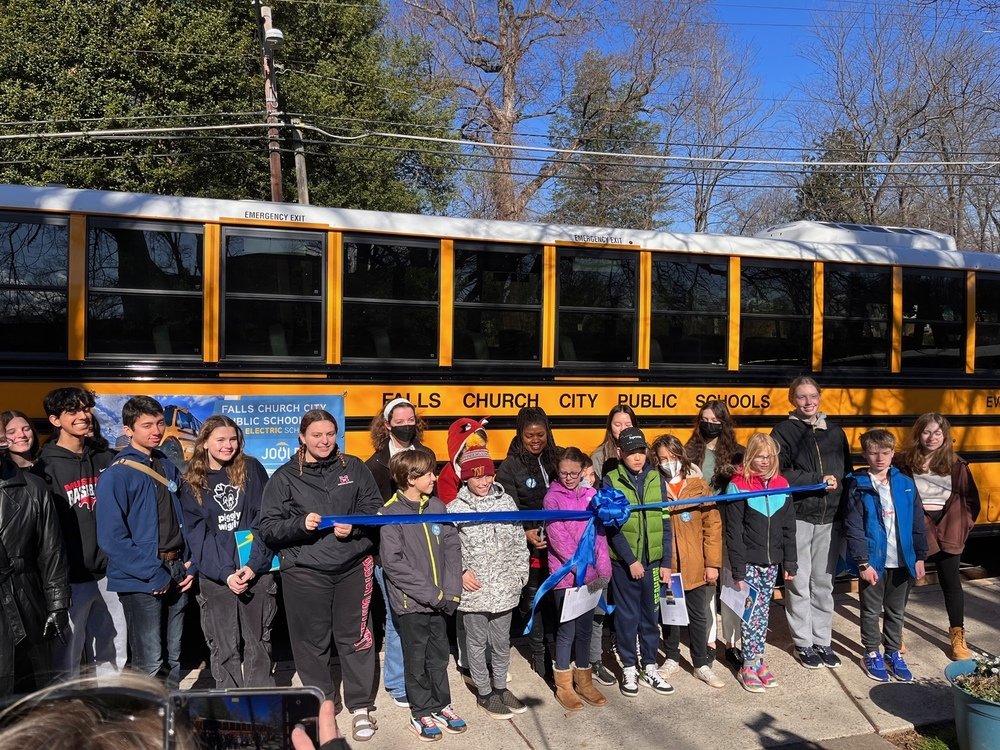The Wheels on the Bus Go Round and Round on Battery Power in Falls Church
By Jeff Peterson
Some Falls Church students now ride one of two all-electric school buses purchased this spring. This is a good thing for the students, because the air quality in electric buses is five times cleaner than in diesel-powered ones. And, it is a good thing for the environment because the new electric buses will reduce emissions of greenhouse gasses that cause climate change by between 60,000 and 100,000 pounds a year.
Falls Church City Public School students attend a ribbon cutting for the City's first two electric school buses in March 2023. (FCCPS photo)
Fun Facts About Falls Church’s Electric School Buses
The new electric buses can travel 135 miles on a three-hour charge.
An electric bus reduces operation and maintenance costs for schools by 60 percent.
Replacing one diesel bus with an electric bus is equivalent to removing five cars from the road, according to Dominion Energy.
The new buses’ batteries will be able to store and inject electric energy into the local power grid during periods of high demand when the buses are not needed for student transportation.
City school buses travel more than 166,000 miles annually as they transport students to and from school and deliver them to field trip destinations and athletic events.
A $530,000 grant from the Virginia Department of Environmental Quality (DEQ) reduced the buses' cost.
Dominion Energy funded the installation of the related vehicle charging infrastructure.
Learn more about the City’s first two electric school buses.
When Will Fall Church Get More Electric School Buses?
Electric school buses make a lot of sense but it will take years to replace the remaining diesel powered schools buses to electric due to several factors:
The existing diesel buses were purchased at different times and, due to their cost, the City is planning to replace them as they reach the end of their service life, estimated to be 12 years. About two new school buses are purchased each year.
Grant funds from federal and state governments can greatly reduce purchase price but these funds are competitive and may support purchase of only one or two buses at a time.
Electric buses need charging stations and supporting infrastructure that will need to be built at a pace to match the delivery of new electric buses.
Demand for electric school buses is growing across the country, which may delay delivery.
To help overcome these challenges, the City of Falls Church has scheduled buying electric school buses in its new Government Operations Energy Action Plan. The Plan provides for buying 12 electric school buses between 2024 and 2030, stating that:
“All new school buses should be electric if feasible with identified funding. In later years, the TCO [total cost of ownership] of electric school buses is expected to reach parity with that of diesel buses.”
With Falls Church City Public Schools operating about 23 buses, only about half of its diesel buses will be retired and replaced by electric buses under the current Plan. At the projected pace, it will take until about 2036 to replace the current diesel buses with electric buses.
Another element of the Government Operations Energy Action Plan is to complete a “route optimization” project for school buses in 2025 to reduce miles traveled and thus greenhouse gas emissions, from all school buses, both electric and diesel. This might allow for a reduction in the total number of buses. The City is also considering using smaller and more fuel-efficient vans for trips for smaller groups of students (sporting events, field trips, etc.), reducing the need for full-size school buses.
In 2022, Vice President Kamala Harris visited Meridian High School to announce new funding of $5 billion nationally over five years for new school buses in the bipartisan Infrastructure Investment and Jobs Act. So,there is some hope that the combination of more efficient routes and opportunities for grant funds from the state or federal government could help speed the transition to electric buses that are healthier for both students and the environment.
